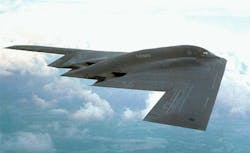Rockwell Collins to manufacture VLF communications system for B-2 jet bomber
Officials of the Air Force Life Cycle Management Center at Wright-Patterson Air Force Base, Ohio, are awarding a $46.7 million contract to Rockwell Collins for the B-2 Common Very Low Frequency Receiver increment 1 engineering manufacturing development (EMD) effort.
The contract calls for Rockwell Collins engineers to modify, qualify, and test a B-2 bomber VLF communications system for the B-2 bomber, consisting of a terminal and receiver, antenna, human machine interface (HMI) display, and ancillary cabling, rack, and equipment to enable receipt and display of emergency action messages.
Related: Air Force scours industry for replacement part to nuclear bomber communications system
In the program's EMD phase Rockwell Collins will perform systems engineering and requirements definition, prototype fabrication, qualification testing, airworthiness certification, and flight testing.
U.S. strategic bombers typically communicate over UHF satellite communications (SATCOM) links, as well as the MILSTAR SATCOM system. These SATCOM links, however, are nearing the end of their anticipated life cycles, and their strategic communications replacement, the Advanced Extremely High Frequency (AEHF) SATCOM system, will not be ready for several years.
Related: Guidance and control for bunker-busting munitions
The VLF radio that Rockwell Collins is designing and building for the B-2 bomber will bridge between the UHF SATCOM and MILSTAR systems and the future AEHF SATCOM system, Air Force officials say.
Rockwell Collins will develop the B-2's VLF communications system within four years to make the system available for the B-2 fleet by late 2017. This timeframe allows for only a modification and qualification program, not a full development program, Air Force officials say.
Related: BAE Systems to provide electronic warfare systems for B-2 bomber
The B-2 VLF system must operate in the airborne nuclear combat environment, be secure, and be survivable, Air Force officials say. It must be nuclear hardened and meet stringent cryptographic requirements.
The award to Rockwell Collins is a sole-source contract. Air Force officials say a contract to any other company than Rockwell Collins would result in unacceptable delays.
On this contract Rockwell Collins will do the work in Richardson, Texas, and should be finished by June 2018.. For more information contact Rockwell Collins online at www.rockwellcollins.com, or the Air Force Life Cycle Management Center at www.wpafb.af.mil/aflcmc.
